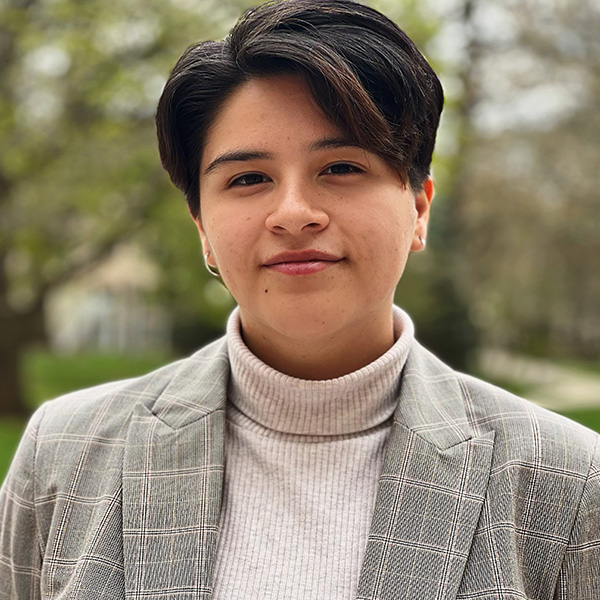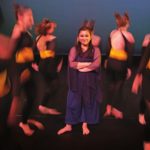
Third World: Bolivia, The United States, Democracy, and The Art of Putting it on Stage

Name: Victoria Silva
Majors: Theatre, Political Science
Minors: Latin American Studies, English
What is the conflict of democracy? Is it reliable? Is it real? And can we put this conflict on a stage? Democracy is an unending sandbox that is constantly shifting depending on the goal posts set around it, and despite this infinite nature, many people want to understand it in a finite context in order to allow it to govern people in a reliable way. In my I.S. I discuss not only the nature of its unreliability, but do so with a specific comparative analysis between the 2019/2020 election cycles of Bolivia and the United States in order to get a contemporary feeling for what it means when democracy is not as representative and streamlined as we would like, and what that means for our perspectives on it and our world going forward. Furthermore, in this interdisciplinary study I also discuss the process of putting such an interpersonal and political conflict on stage, and how we as humans look at other nations, people, and conflicts that are different from ourselves in evolving ways. Within this study is a play and analysis written and directed by me, involving the ways I went from researching nations and their political conflicts surrounding democracy, to a play about the people within those conflicts and their effects. Democracy is a never ending study and I am excited to add not only to that study, but to unpack its impact on our collective humanity.
Posted in Comments Enabled, Independent Study, Symposium 2023 on April 15, 2023.
9 responses to “Third World: Bolivia, The United States, Democracy, and The Art of Putting it on Stage”
Related Posts
Related Areas of Study
Theatre & Dance
Scholarship and artistry in theatre and dance for those who are passionate about performance in all its forms.
Major MinorPolitical Science
The study of power, with concentrations in U.S. politics, international relations, political theory and comparative politics.
Major Minor


Congratulations, Victoria! What a great example of interdisciplinary work.
Many congratulations, Victoria! You should be so proud of this excellent interdisciplinary IS 🙂
This is fantastic, Victoria! I’m so glad to get to watch the recording. Can you share a bit about the production design? I love the dancing letter carriers/personifiers/etc and the light/sound/set/costume/etc. (Also, I went to high school in Bethesda, MD. Well captured.)
Hi Dr. Eager!! Thanks for watching my show! Yes I’d love to talk about them! In the script they are called “Good” and “Mischief” and they serve a bit as an Aristotle-esque Greek Chorus in my Brecht-Style work! I wanted them to be both a comedic relief/while also being influencing on-lookers. One thing I didn’t want for the show was it to be too embargoed by sadness/heavy political discussions because I think thats when audiences tune out the fastest. So the shadows were a great way of adding a liveliness to the show. The set I designed myself alongside help with the talented Mike Schafer, I took inspiration from Japanese and Chinese shadow and puppet theatre, where a scrim is a erected to created the shadows. I made Nyla and Mirella’s rooms encased by that scrim where the shadows could live while their bedrooms lived in front. As they’re sending letters across the world they can’t leave their isolated spaces, but the scrim still connects them. The lighting was designed by a student, the lively Willow Thomas (‘25) and myself, we spent alot of time choosing colors and erecting the booms with the shops help. We wanted the scrim to be colorful, because Bolivia in particular La Paz is so colorful. Quechua culture is so centered on color and that was important to me. As for the costumes, for both of them I wanted them to feel young Gen Z, Mirella is indigenous so I wanted to her to have touched of that, but the actor, Mudiwa Mungoshi, is actually from Zimbabwe not from Bolivia so I had him where his traditional homes clothing, I thought it was more authentic to him while still getting the point across. I did add my own Quechua jacket from my home country of Ecuador to the set on Mirella’s chair just as a little nod to my own heritage and love for my nations in Latin America. We wanted every touch to try and guide the audience to who they were. Nyla was dressed in overalls to have some naivety but to also keep to her growing adulthood. She’s sharp but still learning. As for sound also, the first song is called Tijeras by Renata Flores, its a song almost entirely in Quechua. The rest of the sounds were all Latiné adjacent. It was all meant to be ambient in some way, while also adding to some of the comedy moments and of course the heavy insurrection bit. I hope this longwinded response answers some questions haha! Also thats so funny you’re from that area! I’m glad I captured it well!
Feels like “How I Learned to Drive” and “References to Salvador Dali…” were a million years ago. So proud of you and all the work you’ve done to get here! Wish I could be there in person!
Thanks, Victoria! I love longwinded responses as you know. ; ) So much of this came through in watching the production on its own and it’s great to learn the details and all the people behind it. Congratulations to the team and especially to you!!!
I remember seeing the production and it was a fascinating look into ideas I had never fully considered before. It definitely fulfilled its goals of opening a conversation on our concepts of “first world” countries, and the issues of that mindset.
Such a brilliant play and what a great way to show off the capabilities of what an IS can be! I hope Silva is able to put this play on in the future because I think it offers the audience a great opportunity for conversation and for us as on lookers to check our own privileges.
Amazing and just so well done. I was able to see it in person and was so impressed by the topic, the way it was delivered and the mail carriers theatrical part of the story telling only enhanced the play. Wonderful project and close to my heart as someone who emigrated from South America and has lived in both parts of the world. Congratulations!!